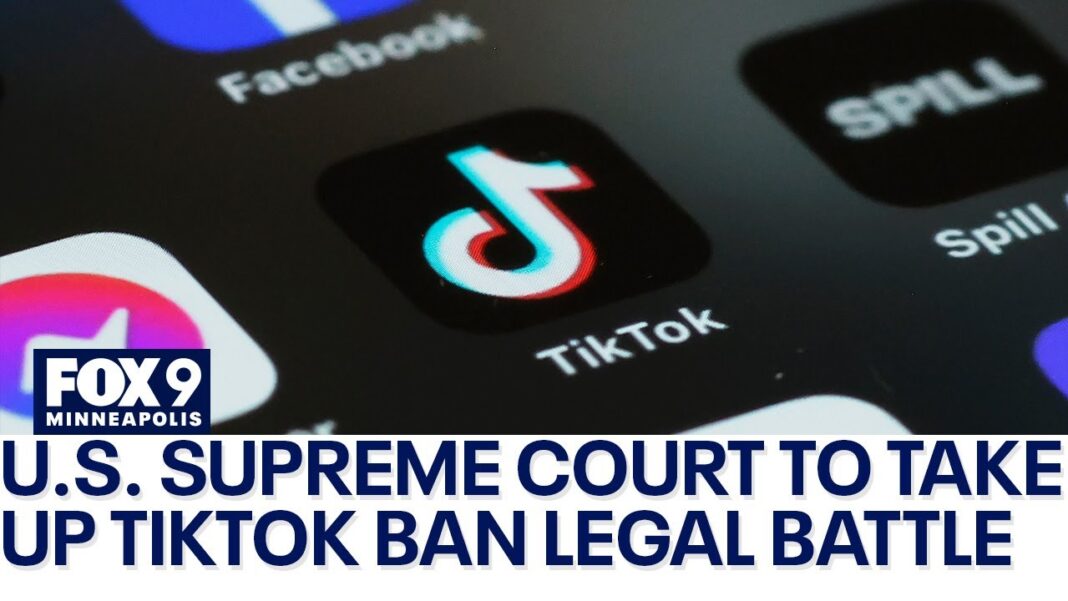|
Getting your Trinity Audio player ready...
|
The Supreme Court appears poised to uphold a divest-or-ban law on TikTok, with even the Court’s liberal justices punching holes in the Chinese-controlled app’s arguments that the law is unconstitutionally stifling its free speech rights.
Justices from across the ideological spectrum agreed that TikTok’s CCP-controlled parent company, ByteDance, does not have a fundamental right to free speech in America. They also concurred with Congress’s assessment that China could easily exploit the personal data of more than 170 million American TikTok users, posing a severe national security threat.
President Joe Biden approved the TikTok law in April 2024, after the legislation quickly gained steam in both the House and Senate. The measure forces TikTok to fully divest from parent company ByteDance or face an all-out ban by Jan. 19, the day before President-elect Donald Trump takes office. While TikTok could continue to exist under American ownership, its leaders maintain that access to ByteDance’s proprietary social media algorithm is pivotal to its existence.
Noel Francisco, an attorney for TikTok and ByteDance, argued that the ban should be delayed until after Trump takes office, giving all sides more time to reach a deal that staves off a full ban. Trump petitioned the Supreme Court last month to delay its ruling until he can review the matter as president.
The Court’s final decision, expected early next week, comes amid uncertainty as to how Trump will handle the situation in light of his repeated promises to save the app. To achieve true divestiture, Trump would have to negotiate a tricky diplomatic deal with ByteDance that Beijing would likely veto, one veteran China analyst told the Washington Free Beacon. A more lenient deal, meanwhile, would likely see Beijing retain some level of influence over TikTok—and upset the vast majority of lawmakers from both parties who supported the original ban.
“It’s basically impossible for Trump to make a deal that fulfills the requirements of a divest-or-ban law without prompting Beijing’s veto,” said the analyst, who spoke on background to discuss the situation candidly. “So the question is, will Trump force an outcome that essentially fails to meet the spirit of the law but pretends to do so?”
“It’s possible that Trump pulls together a deal in which there is a normal divestiture—that is, there’s a new corporate entity invented—but Beijing’s influence remains.”
TikTok maintains that a forced divestment from ByteDance violates the company’s right to free speech, claiming that without the CCP-controlled firm’s proprietary technology, the app will cease to exist, erasing a platform used by millions of American content creators.
The justices conceded that TikTok’s American enterprise may have a right to free speech but made clear that its corporate rulers in China do not. The ban, several of the justices said, only targets ByteDance and provides TikTok with ample opportunity to find an American alternative.
“What’s the problem here?” Justice Elena Kagan, an Obama appointee, said in response to Francisco’s free speech arguments against a ban. “ByteDance is a foreign company.”
“This statute says the foreign company has to divest. TikTok still has the ability to use whatever algorithm it wants, doesn’t it?” Kagan asked. If the law is upheld, TikTok still retains the “ability to do what every other actor in the United States can do, which is, go find the best available algorithm,” she said.
“The law,” Kagan added, “is only targeted at this foreign corporation which doesn’t have First Amendment rights,” echoing a sentiment expressed by other justices.
Justice Clarence Thomas, a conservative member of the Court, said TikTok’s arguments fall flat because ByteDance is headquartered in China.
“You’re converting the restriction on ByteDance’s ownership of the algorithm and the company into a restriction on TikTok’s speech,” Thomas said. “So why can’t we simply look at it as a restriction on ByteDance?”
Justice Ketanji Brown Jackson, the Court’s newest member and a Biden appointee, also challenged TikTok’s assertion that the app cannot survive without ByteDance’s algorithm.
“If TikTok were to, post-divestiture or pre-divestiture, come up with its own algorithm, then when the divestiture happens, it could still operate,” Jackson said. “It doesn’t say, ‘TikTok, you can’t speak.'”
TikTok, she added, “can continue to operate on its own algorithm, on its own terms, as long as it’s not associated with ByteDance. So isn’t this really about association?”
“That’s theoretically correct, your Honor,” TikTok lawyer Francisco conceded under questioning.
“The fact that’s true,” Jackson responded, “suggests you’re wrong about the statute being read as ‘TikTok you have to go mute.’”
The justices also rejected arguments that Congress is merely trying to ban the app for disseminating content critics see as propaganda.
While the app has been a hotspot for anti-Israel and anti-Semitic activity since Hamas’s Oct. 7 attack on Israel, the law has little to do with what TikTok actually publishes. It hinges, rather, on the national security implications of a Chinese government-controlled company having access to Americans’ personal data.
“Congress and the president were concerned that China was accessing information about millions of Americans, tens of millions of Americans, including teenagers, people in their 20s,” said Justice Brett Kavanaugh, a Trump appointee. “They would use that information over time to develop spies, to turn people, to blackmail people, people who a generation from now would be working in the FBI or the CIA or in the State Department.”
In response, Francisco told the Court he is “not disputing the risks” but rather the “means they’ve chosen.”





